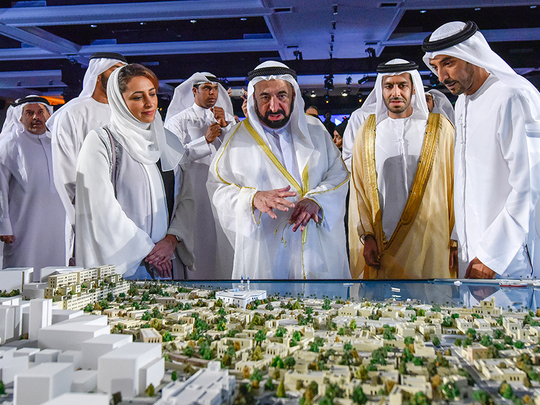
Sharjah
His Highness Dr Shaikh Sultan Bin Mohammad Al Qasimi, Member of the Supreme Council and Ruler of Sharjah, opened the second edition of the Sharjah Foreign Direct Investment (FDI) Forum yesterday.
The event, taking place at Sharjah’s Al Jawaher Reception and Convention Centre, brought together more than 300 government officials, financial experts and businessmen from around the world. It is organised by the Sharjah Investment and Development Authority (Shurooq) in collaboration with the Financial Times and fDi Magazine.
In his opening remarks, Dr Shaikh Sultan said foreign direct investment leads not only to wealth in economic terms, but also builds a nation’s culture, art and literature, and that the most desirable economy is one which can be measured in terms of its positive effects on society. “We want an economy that contributes to building a society and culture that strengthens ties within it. This culture can create a balance between one’s identity and society at large,” he said.
“Our outlook for foreign investment and investors in Sharjah goes beyond its material implications. Foreign investment is a bridge for cultural exchange and a bridge for sharing science, knowledge and expertise. It is a bridge for sharing knowledge in every sense of the word, exactly like the trade convoys used to do throughout history when they used to transport books, philosophy and news about discoveries and inventions, along with the goods they were transporting,” he added.
Following Dr Shaikh Sultan’s speech, Abdullah Al Saleh, Under Secretary for Foreign Trade and Industry Affairs, at the UAE Ministry of Economy, gave a welcome address, in which he highlighted the UAE’s diversification of its economy away from oil and increasing the attractiveness of the country for FDIs.
“The UAE is aware, in the light of its wise leadership, that it’s very important that the country should not depend on oil … but adopt different policies in order to have economic diversity and resilience. These policies have been able to reduce the dependence on oil,” he said.
Reduced dependence
The UAE aims for the contribution of oil to its GDP (gross domestic product) to fall to 20 per cent by 2021.
“We are aiming to increase the UAE’s diversification programme to permanently reduce our reliance on oil, the price of which is not set to rise anytime in the near future … we intend to build a knowledge-based economy that is underpinned by an increase in FDI and a greater number of free trade agreements,” Al Saleh said.
The UAE has set a goal to make the country more attractive for foreign direct investments, he said. “We do believe that FDI allows us to have more liquidity in the national economy and to increase the diversity of this economy.”
The UAE aims to increase the contribution of FDI to 5 per cent of its GDP by 2021. Al Saleh stated that an FDI law is expected to be issued soon. This law is expected to provide incentives for foreign investors. “It reinforces the confidence in the investment environment in the UAE.”
The UAE is working on having high quality foreign direct investments in sectors including education, renewable energy, technology, transport and health care, he said, adding that it is also focusing on the manufacturing and tourism sectors.
The FDI inflows to the UAE hit $11 billion (about Dh40 billion) last year.
On Wednesday, industry experts discussed investment opportunities in the UAE beyond oil; strengthening trade links between the UAE and Europe; financing cross-border expansion; and harnessing the investment potential in the UAE’s transportation and logistics sector to meet with expanding trade demand, among other topics.
Global connectedness
Experts also discussed the importance of global connectedness for small and medium-sized enterprises (SMEs]. Sharjah alone has more than 45,000 SMEs.
Panel discussions today will be on growing trade links between India and the UAE; prospects for FDI in the UAE and the Middle East in the coming year; and investing and growing businesses in the UAE.












